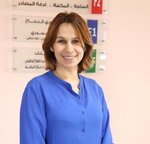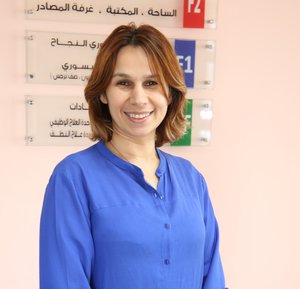Farah Darwazeh
- Nature of Work
- Academic
- Profession
- Director of the An-Najah Childhood Institute/Director of the Palestinian Child Institute
- Email Address
- [email protected]


Farah Darwazeh
- Nature of Work
- Academic
- Profession
- Director of the An-Najah Childhood Institute/Director of the Palestinian Child Institute
- Email Address
- [email protected]
- Course Title
- 7242101
- Course Number
- Rehabilitation Psychology for PT
- Instructor Name
- Farah Darwazeh
- Contact Information
- [email protected]
- Semester(s) and academic year(s)
-
Second Semester 2
Second Semester 1 - Compulsory / Elective
- Compulsory
Rehabilitation psychology is a field that is unique in scope, application, and standards of practise. As PT, it is necessary to understand the fundamental forms of diagnosis and ethical practise in Clinical Psychology as well as actual diagnostic criteria and characteristics. In addition, models for collaboration and treatment planning in multi-disciplinary teams are explored.
1.Knowledge and understanding:
1.1. Understand the role of the Rehabilitation psychology in the fields of education, rehabilitation and mental health treatment.
1.2. Be able to site current international ethical guidelines and standards for all Rehabilitation involving vulnerable populations
1.3. Understand current diagnostic systems including DSM IV and ICD 13
1.4. Understand criteria and characteristics of Childhood Disorders
1.5. Understand criteria and characteristics of Adult Disorders
1.6. Be familiar with models of multidisciplinary service provision.
2.General and transferable skills:
2.1. Familiarization with ethical and professional standards internationally
2.2. Experience in diagnosis based treatment planning.
3.Intellectual skills:
3.1. Analyze and apply diagnostic information to PT treatments
- Professional skills:
4.1. Incorporating the principles of ethics and professional role and standards in daily functioning as a PT
4.2. Enrich professional understanding by familiarity with international standardized guidelines for ethics and standards of Rehabilitation practise
Course Content
Specific Objective
Time Table
Introduction to Rehabilitation Clinical Psychology
Review ILOs and requirments of the course.
- Definition of Clinical Psychology as diferentiated from other mental health professionals
- Historical devlopment of psychology
- Scope of Practise of Clinical Psychology
1rst week
The practise of Diagnosis in Clinical Psychology and Diagnostic Systems
- What is diagnosis?
- What are the current Diagnostic Systems used in Mental Health, Education, and Rehabilitation (DSM/ ICD, etc.)
- How is diagnosis determined?
- Diagnosis and Treatment Planning
2nd week
Ethical Standards in Clinical Psychology and PT
- What are ethics?
- What is the ethical standard for clinical & Rehabilitation service provision?
- What are the monitoring systems for ethics?
3rd week
Treatment Principles and Models
- Evidence based Treatment Models
- Treatment Modalities
- Treatment parameters
4th week
Professional Boundaries and Collaboration
- Professional boundries in clinical service provision
- Wholistic and Wrap Around Care
- Comprehensive Treatment Planning
- Collaborative Practise
5th week
TEST ONE
- General Principles in Rehabilitation Practise
6th week
CHILDHOOD DISODERS:
Autism Spectrum Disorder
- Diagnostic Criteria for ASD
- Characteristics of ASD
- Evidence based Treatment ASD
- SLP needs in ASD
7th week
Intellectual Deficit
- Diagnostic Criteria for ID
- Characteristics of ID
- Evidence based Treatment ID
- SLP needs in ID
8th week
Attention Deficit Disorders
- Diagnostic Criteria for ADD/ADHD
- Characteristics of ADD/ADHD
- Evidence based Treatment ADD/ADHD
- SLP needs in ADD/ADHD
9th week
Trauma, Anxiety and Selective Mutism
- Diagnostic Criteria
- Characteristics
- Evidence Based Treatment Models
- SLP Needs
10th week
Physical and Genetic Disorders
- Range of diagnosis
- Characteristics
- Treatment consideration for SLP
11th week
EXAM TWO
- Childhood Disorders
12th week
ADULT DISORDERS:
Schizophrenia
• Diagnostic Criteria for Psychotic Disorders
• Characteristics of Psychotic Disorders
• Evidence based Treatment for Psychotic Disorders
• SLP needs in Psychotic Disorders
13th week
Anxiety, Depression and Tourette’s Syndrome
- Diagnostic Criteria
- Characteristics
- Evidence based Treatment
- SLP needs in Anxiety, Depression and Tourette’s
14th week
Alzheimers/ Stroke and other Physical Injury
- Diagnostic Criteria
- Characteristics
- Evidence Based methodology
- SLP needs
15th week
FINAL EXAM
- Adult Disorders
16th week
Diagnostical and Statistical Manual of Mental Disorder (DSM5)
Materials will be provided from the teacher during the first week of each section.
| Activity | Percent (%) |
|---|---|
| Written Exams | 30% |
| essays, case analysis, review article | 20% |
| Final exam | 50% |